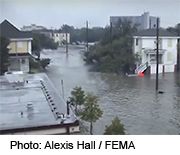SUNDAY, Sept. 27, 2020 (HealthDay News) — If you’re in an area of the United States at risk for flooding during one of the most active hurricane seasons ever, there are a number of precautions you should take, the U.S. Federal Emergency Management Agency (FEMA) says.
Make a plan for your household, including your pets, so that you and your family know what to do, where to go and what you will need to protect yourselves from flooding as well as COVID-19.
Gather supplies, including nonperishable foods, cleaning supplies and water for several days, in case you have leave your home immediately or if services are cut off in your area.
You should have at least three days’ worth of supplies on hand, including one gallon of water per day for each person and pet, the U.S. Centers for Disease Control and Prevention recommends.
If possible, include items such as soap, hand sanitizer that contains at least 60% alcohol, disinfecting wipes and household cleaning supplies that you can use to disinfect frequently touched surfaces. After a flood, you may lack access to these supplies for days or even weeks.
Take into account the specific needs of each person and pet in your household, including medication. Include extra batteries and charging devices for phones and other critical equipment.
Know types of flood risk in your area. Go to FEMA’s Flood Map Service Center for information. Sign up for your community’s warning system. The Emergency Alert System and National Oceanic and Atmospheric Administration Weather Radio also provide emergency alerts.
If flash flooding is a risk, monitor potential signs, such as heavy rain. Learn and practice evacuation routes, shelter plans and flash flood response.
If you live in a storm surge flooding zone or a mandatory hurricane evacuation zone, make plans to stay with family and friends. Evacuate to shelters only if you can’t stay with family or friends. Be aware that some shelters do not accept pets.
Hurricane season runs through Nov. 30.
More information
Ready.gov has more on emergency preparedness.
Copyright © 2025 HealthDay. All rights reserved.

